Interview: Mel Brooks and Susan Stroman Look Back on 20 Years of The Producers
It was 20 years ago this month that Producers-mania descended upon New York City. To call this "new Mel Brooks musical" merely a sensation was an understatement at the time; it lit up Broadway in a fashion that had rarely been seen before, and really only repeated by Hamilton 14 years later. Lines down the street for the box office. Headlines in all the daily newspapers. A record number of Tony Awards. You couldn't even get scalped tickets, that's how hot it was.
At the time the musical was born, the creators of The Producers already had a string of hits under their respective belts. Brooks needed no introduction then, and now, at 94, certainly doesn't. Co-writer Thomas Meehan, who died in 2017, also wrote the internationally beloved Annie (and followed up The Producers with Hairspray). Susan Stroman had three Tonys on her mantel, for her choreography of Crazy for You, Show Boat, and Contact, and had recently added "director" to her résumé with Contact and The Music Man. But it was a lighting-in-a-bottle experience for everyone involved, and turned its company, led by the indomitable Nathan Lane and Matthew Broderick, into the talks of the town.
To mark the 20th anniversary of the show's opening night (April 19, 2001), Brooks and Stroman (or, "Stro," as she's commonly known) gathered in their respective homes for a Zoom conversation about what it takes to make a hit and how it feels to watch The Producers, their theatrical baby, continue to take over the world, two decades later.
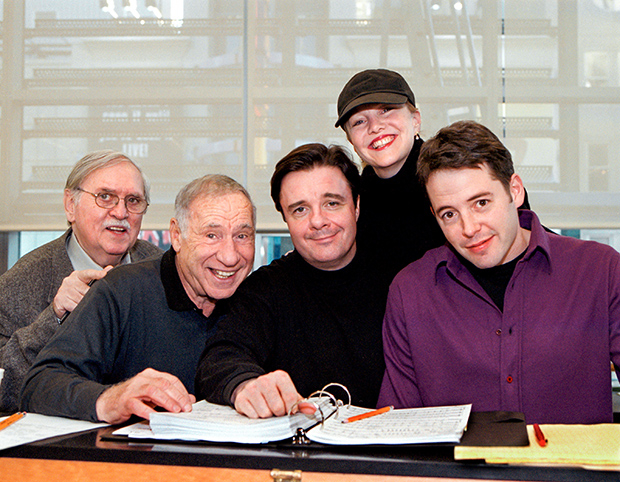
(© Paul Kolnik)
Mel, when did you first say, "I'm going to turn The Producers into a musical?"
Mel Brooks: David Geffen called me at least once a week and said, "This movie was destined to be a Broadway musical." I kept saying, "It's a perfectly good little movie. I have an Academy Award for the screenplay. Forget it. Don't bug me." Finally, I said, "OK, David, let's make it a musical." I was hoping that since I had written the songs "Springtime for Hitler" and "Prisoners of Love" [for the film] that he'd be OK with me writing the score, but no; he sent me to Jerry Herman. Jerry said, "You're crazy. You've got two songs, write six or seven more, you're a natural songwriter," and called David Geffen and said, "I'm a songwriter, and I know when another songwriter is good. He can do it."
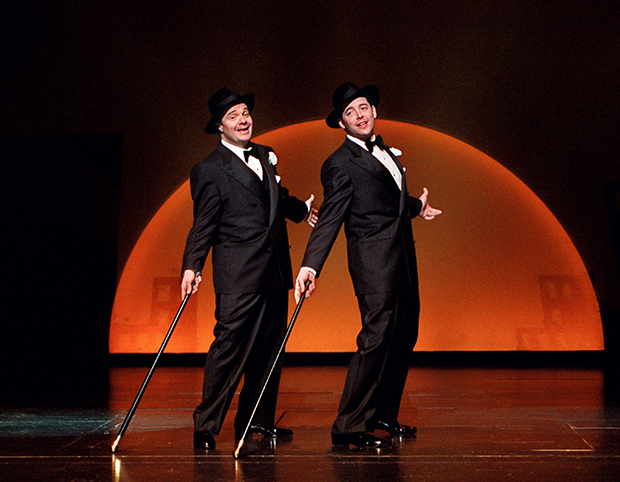
(© Paul Kolnik)
Were you afraid of completely rebuilding this property that had gotten you such acclaim already?
Mel: I was terrified. But from the first minute I met Stro and her wonderful, late husband, Mike Ockrent, they pointed our feet in the right direction and helped us get there. Mike [the initial director] was wonderful in terms of the book and story, what to lose, what to add. Mike had leukemia and left us, and Stro, who was doing our choreography then, was really flattened out. Literally grief-stricken. Geffen had come to us with a couple of ideas for directors, but Tom Meehan and I had seen her show Contact at Lincoln Center, and it was incredible. We said, "Let's give it to Stro," and Stro said, "Can't do it." I grabbed her by the shoulders, and I said, "Stro, cry in the morning, come to rehearsal, work, go home, cry, go to sleep, wake up, cry," and two or three days later, she said, "OK, I'm gonna try that."
Susan Stroman: You promised me that you would make me laugh during the day. Cry in the morning, cry at night, but you would make me laugh all day. I can say you saved my life during that time. You really did.
Mel: Thank God for my grotesque looks. Down the road, David Geffen had too much to do with his new company, Dreamworks, so he couldn't continue on. I remember, we did a piano reading at Nola Studios. I think it was April 9, a year before we opened, and it was snowing. Snowing in April. It was crazy. We got to the end of the first act, and an avalanche of Jews attacked us saying, "We want to be your producers." Rocco Landesman, who was running Jujamcyn, said, "Would you want the St. James?" He put together a nice producing team and it was meant to be.
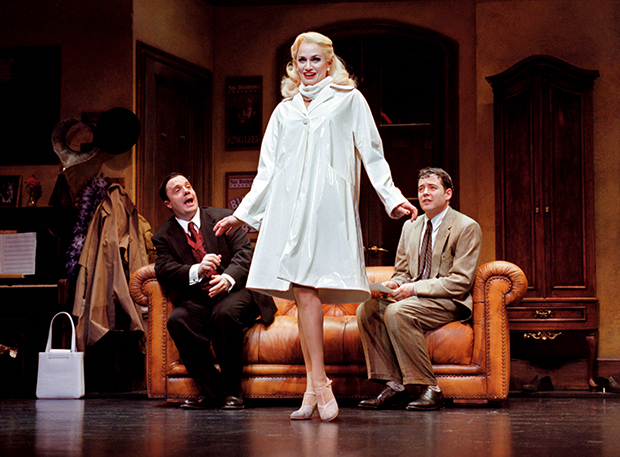
(© Paul Kolnik)
At what point did you realize that the show not only worked, but was leaving people in hysterics?
Mel: I think it was the first preview in Chicago, right, Stro?
Stro: The sound of the audience that night was deafening. It was like the roof was going to blow off. It was amazing to think that someone would love your show that much. Do you remember, Mel, after that first preview – we would always go to that same restaurant in Chicago – and the whole cast was there and so elated, and all of a sudden, a conga line formed, and we all got in the conga line?
Mel: I completely forgot about that.
Stro: Even Nathan [Lane], who is not the conga line type, got in the conga line. You, me, Anne [Bancroft, Brooks's wife], Tom. It was thrilling.
Mel: Tom Meehan, who wrote the book with me – I miss him so much, God bless him – we were thrilled with the reception, but he said, "New York is different. Audiences are not that giving. To get your dream response in New York, you really gotta be good." Ben Brantley gave us such an incredible review in The New York Times on opening night. God was good to us. It was more than just a Broadway opening. It made headlines. Lines wrapped around the St. James Theatre.
Stro: That was when you still lined up for the box office, which you don't do anymore.
Mel: What a phenomenon. Standing room only. They really packed the back of the St. James with standing room. It's hard to put such joy into words. It was one in a million.
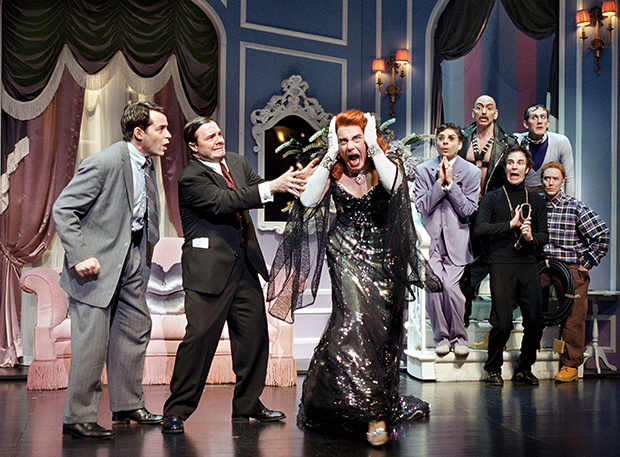
(© Paul Kolnik)
How do you stay humble, and how do you keep your actors humble, when they're coming to work seeing lines around the block every day?
Mel: You don't. You let them get egomaniacal. [laughs]
Stro: But the show was exhausting for them, so they couldn't get too crazy. They rode on the laughter of the audience. They couldn't get enough of the laughter. We were quite blessed with the cast on Broadway. They all gave 100 percent every night. Nathan is a true powerhouse. He really drove the show. He was born to play that part. He had a magical chemistry with Matthew. And Matthew was a perfect foil for Nathan. He found all these small, interesting quirks that made Leo such a wonderful, nuanced character. Cady Huffman is a true triple threat. Who else can back flip off a desk and land in the splits, all while singing? Besides gorgeous, she also made Ulla smart. Ulla always knew exactly what she was doing. Roger Bart was extraordinary as Carmen; Roger can find the funny in anything. He and Gary Beach were an incredible team. Gary was so funny. He loved—
Mel: Being Judy Garland!
Stro: He loved that moment.
Mel: He crossed his legs and sat at the edge of the stage and did "I was born in a trunk…" Gary Beach was amazing.
Stro: Brad started out as the swing. Mel wrote the "Break a Leg" song and the Nazi character does, and that's exactly what happened [in real life].
Mel: The guy playing Franz Liebkind, he was wonderful, but he twisted his knee so badly, he couldn't go on.
Stro: Brad stepped in and carried it to New York. He was our hero.
Mel: Brad was the relief pitcher. He can do anything. If anybody got sick, including Cady Huffman, he could play Ulla.
Stro: And now Brad talks to swings about how important it is to be prepared.
Mel: He was one of the longest Bialystocks, too.
Stro: He went on one of the tours for a very long time.
Mel: We were so lucky that Brad Oscar was waiting in the wings.
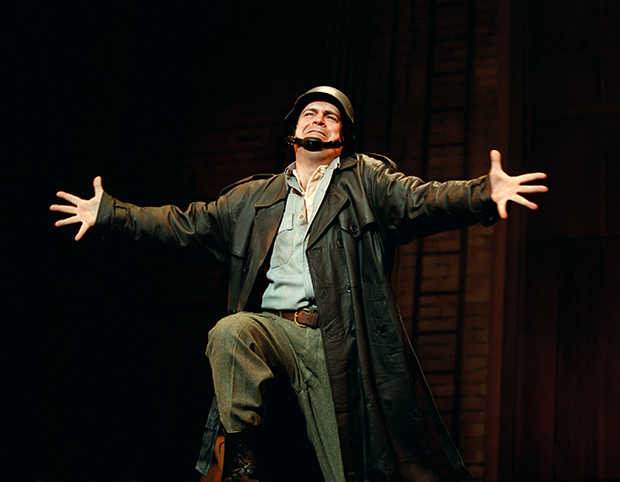
(© Paul Kolnik)
How do you quantify the magic of the whole original cast?
Stro: They were one of a kind to begin with. There's no one like those particular principals. They had such talent to contribute to the show, and they all are very funny and understand comedy. I know Mel will agree with this, but that is something you cannot teach.
Mel: Andreas Voutsinas, who played Carmen Ghia in the original movie, used to say, "Or you got it, or you ain't." That was our casting. And you never knew when a miracle was going to happen. I wrote a song called "Along Came Bialy" for the little old ladies, and I said to Stro, "I don't like the song, I don't like the tune, I can do better." And she said, "Leave it alone," and I said, "No, I'm gonna throw it out," and she said, "Leave it." Two weeks later, I saw little old ladies dancing on walkers.
Stro: When I was doing pre-production on that number, I didn't know what you could do with a walker. Could you jump on it? Could you make it tap? So I got a walker and went to the studio and thought, "OK, this could work. I could get 20 little old ladies onstage."
Mel: You got such great taps out of those walkers. Ugh, fabulous.
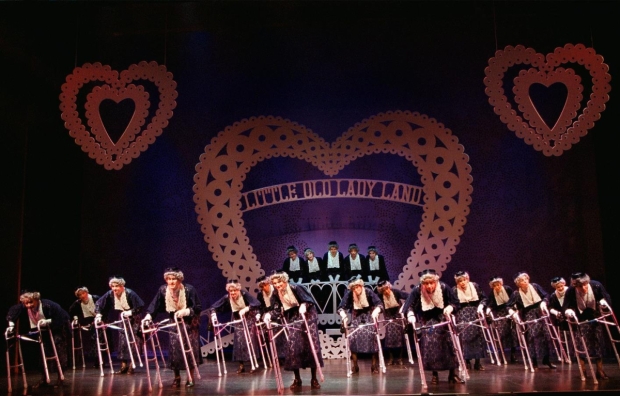
(© Paul Kolnik)
Besides that, what is your hands-down favorite moment from the show?
Stro: "Springtime for Hitler."
Mel: That's it. That's the one.
Stro: It's a perfect production number. When we were working on it at the New 42nd Street Studios, I would be afraid that, out of context, if someone was in their apartment and looked over, they would think we were some kind of Hitler Youth or something, so there was a cue for the stage manager to hit the shades during "Springtime for Hitler," and then they'd go back up again when we were done.
Mel: The audience around me, some of them were hysterical, and some of them were just, frankly, shocked. I remember at one of the previews, that big guy got out of his seat – this is true – he's storming up the aisle saying, "How dare you? This is disgraceful. Where's Mel Brooks?" I met him at the top of the aisle, and he was a big guy. Scary guy. And he said, "I was a soldier and I fought for this country, I was in World War II." And I said to him, "I was in World War II, also. I didn't see you there." [laughs]
"Springtime for Hitler" was crazy. I said to Stro in rehearsal, "Too bad we can't have it like we did in the movie, with the overhead shot of the rotating swastika," and Stro said, "Let me think about it." A week later, there was a 45-foot mirror pointing down at the stage, and the audience, looking up at it, saw the rotating swastika. That's why Stro is the best. If you get Susan Stroman to stage your show, you've got the very best. Genius.
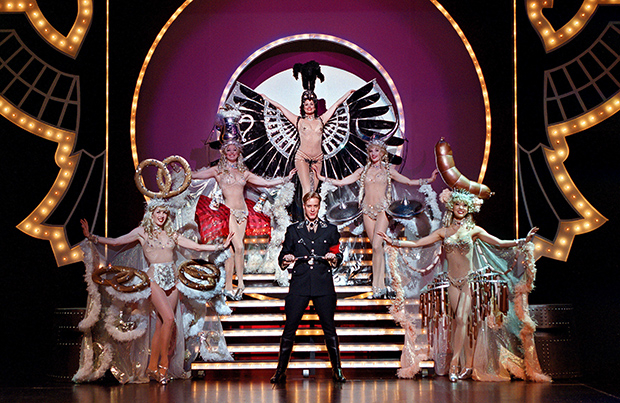
(© Paul Kolnik)
Looking back, was the success of this show the fulfillment of a lifelong dream?
Mel: If we were on television and you asked that, I'd say, "Of course it was." The truth is, bullshit. The fulfillment of a lifelong dream? In show business, yes. But there are other things. There's children. There's a good Chinese meal. There's a lot of other good stuff. I don't know if it's the fulfillment of a lifelong dream, to be honest, but for show business, you cannot beat it. That's my take. Stro, you're on.
Stro: To have a show that swept Broadway and is still around 20 years later, somewhere in the world, is pretty special. I am grateful and so thankful it was embraced like it was. They just did it in Japan and it was a huge hit.
Mel: If you want to fly to Paris to see it, I think they said it'll be there in late December or early January. You don't even have to speak French. I didn't see it in Germany, but Tom Meehan said that when they did "Springtime for Hitler," it got very quiet. But it got a standing ovation at the end of the show.
Stro: That was a wild moment. That was in Vienna. I think they just didn't want people knowing what they thought about that particular number. But they loved it. There's nothing greater than the sound of laughter from a live audience. It always made us very happy.
Mel: It is a beautiful combination of singing and dancing, and comedy. We still have 12 Tonys, the most ever given to a show on Broadway. Hamilton got close, but didn't snatch the crown away from us. Someone at the Guardian said, "The Producers puts the comedy back in musical comedy," which made me feel really good. When it isn't singing and dancing and lifting your heart, it's making you laugh.
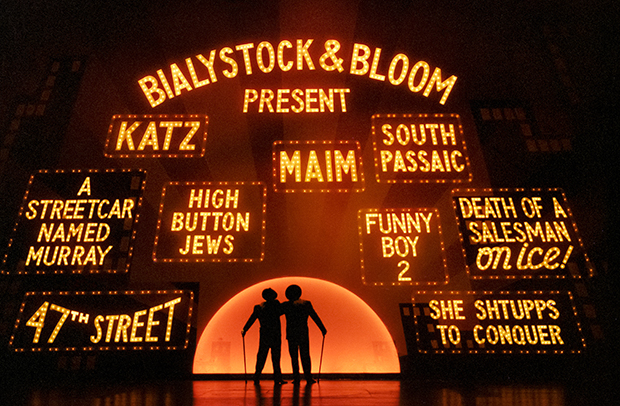
(© Paul Kolnik)










